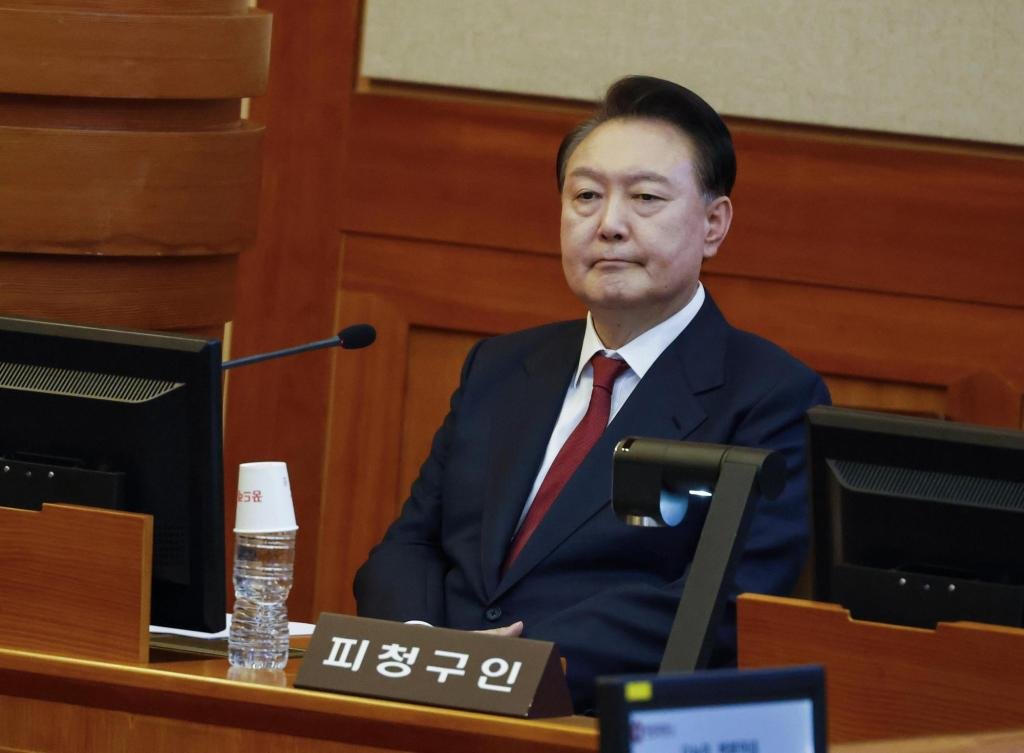Seoul, South Korea – South Korean prosecutors on Sunday accused the President of impeachment, Yun Suk Yeol, of rebellion regarding his short -term martial law, is a criminal charge that may lead to a death sentence or life imprisonment if found guilty is found guilty .
This is the latest blow for Youn, which was impered and arrested for the December 3 marshal law decree, which put the country in political upheaval, shook its financial markets and damage its international image Reacted Separated from criminal judicial proceedings, the Constitutional Court is now considering whether Yu should be formally dismissed or restored from the presidency.
Yu has become the first President of South Korea, who has been prosecuted while holding office. He will remain in jail and will be taken from the detention center to Seoul’s court to hear the trial, which is expected to last for about six months.
The prosecutors said in a statement that they convicted Yu on the charge that he had directed the rebellion while implementing martial law. The investigating officials had earlier alleged that Yun’s martial law was similar to the rebellion, as they had riots for the purpose of weakening the constitution.
Union’s rescue team criticized the prosecution and described it as the “worst decision” of the prosecutors, saying they are trying to favor the political forces who want to exclude Yun.
Yu’s defense team said in a statement, “Today’s prosecution on the President will be a shame in the history of South Korean prosecutors which they cannot erase.” “We once again insist that the President’s martial law announced can never be rebellion.”
Union is exempted from most criminal cases, but it is not extended to allegations of privilege rebellion or treason. According to the law in South Korea, the leader of the rebellion may face life imprisonment or death penalty.
The orthodox Union has strongly denied any wrongdoing, he has described his announcement of martial law as a legitimate task of governance, which aims to raise public awareness about the threat of liberal-controlled National Assembly, which in his agenda Obstaged and impeached top officials. During the announcement of Marshall Law, Yun called the assembly a “base of criminals” and vowed to eliminate “shameless North Korea followers and anti -state forces”.
After declaring martial law on 3 December, Yun sent army and police officers to the assembly, but still sufficient MLA managed to enter the assembly room to unanimously dismiss the decision of the MLA, so that their cabinet was removed To be forced to
In more than four decades, the first martial law of its kind was imposed in South Korea, which lasted for only six hours. However, it represented painful memories of previous dictatorship in South Korea in the 1960–80s when military-backed rulers used martial law and emergency orders to suppress opponents.
The Constitution of South Korea gives the President the power to declare martial law to maintain the system in the war and other comparable emergency states, but many experts say that the country was not in such circumstances when Un Unnounces martial law.
Yun insisted that he had no intention of obstructing the work of the assembly, which included floor votes on his orders and the meaning of deploying soldiers and police forces was to maintain the system. But the commanders of military units sent to the assembly have told the assembly hearing or investigators that Yun ordered them to be pulled out to prevent them from overturning their order.
The investigation on Yu has intensified the country’s already serious internal division, with rival protesters regularly holding rallies in Seoul city.
On January 19, after a local court approved a formal arrest warrant to increase the custody of Yu, his dozens of supporters attacked the court building, destroying windows, doors and other property. He also attacked police officers with bricks, steel pipes and other items. 17 police officers were injured in the violence and police said they had detained 46 protesters.
Yun had previously opposed efforts by investigating officers to interrogate him or take him into custody. He was then caught in a major law enforcement campaign in his President’s campus on 15 January.
Yu was headed by the corruption investigation office for high-ranking officers, but Union has refused to attend the CIO inquiry session since he was detained, saying that he had allegations of rebellion. There is no legal right to investigate. The CIO has said that it can investigate the charge of Union’s rebellion as it belongs to the alleged misuse and other allegations of his power.
The CIO on Friday handed over the case of Yu to the office of Seoul prosecutors and asked him to convict him for rebellion, misuse of power and obstructing the National Assembly. The prosecutors said that they blamed Yu only for the rebellion, given that Yun was exempted from the President from other allegations.
Yu’s Defense Minister, Police Head and several other military commanders have already been arrested on alleged rebellion, misuse of power and other charges related to martial law decree.
If the Constitutional Court decides to remove Union from the post, a national election should be held within two months to choose his successor. Recent public surveys show that the ruling and opposition party candidates are face to face in the race for a possible presidential by-election.
